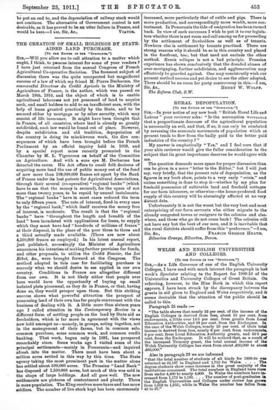THE CREATION OF SMALL HOLDINGS BY STATE- AIDED LAND PURCHASE.
[To THE EDITOR 07 THE "srscrero5."]
you allow me to call attention to a matter which ought, I think, to possess interest for some of your readers ? I have just returned from the annual Congress of French Agricultural Co-operative Societies. The foremost subject of discussion there was the quite unexpected but magnificent success of a law of which my friend M. Pierre Decharme, the resourceful Directeur du Credit Agricole in the Ministry of Agriculture of France, is the author, which was passed on March 19th, 1910, and the object of which is to enable agricultural labourers not yet possessed of land to acquire such, and small holders to add to an insufficient area, with the help of loans granted practically by the State, and to be secured either by mortgage or by other security, which may consist of life insurance. It might have been thought that in France, of all countries, where land is already so greatly subdivided, such law would be found out of place. However, despite subdivision and old tradition, depopulation of the country is doing its mischievous work, the dire con- sequences of which have been brought before the French Parliament by an official inquiry held in 1909, and by a special report more recently presented to the Chamber by M. L. Vigouroux on behalf of the Committee on Agriculture. And with a sure eye M. Decharme has detected the cause. His Act offers to small folk desirous of acquiring more land the use of public money out of the fund of now more than 100,000,000 francs set apart by the Bank of France under its last patente for Agricultural Associations, through their several (co-operative) "regional banks" (which have to see that the money is secured), for the space of not more than twenty years, to be repaid by annual instalments. The " regional banks " have in most cases reduced the term to only fifteen years. The rate of interest, fixed in every case by the " regional bank," which itself receives the money free of interest, is moderate. The result is that the "regional banks " have " throughout the length and breadth of the land" been inundated with applications for loans, to supply which they must have had "hundreds of millions of francs" at their disposal, in the place of the poor three to three and a third actually made available. (There are now about 4,500,000 francs so employed.) In his latest annual report, just published, accordingly the Minister of Agriculture announces his intention of making further provision for funds, and other proposals, to utilize the Credit Foncier, the Loi Ribot, &c., were brought forward at the Congress. The method adopted in this case for facilitating purchase is scarcely what we should desire to see applied in our own country. Conditions in France are altogether different from our own. It is not likely either that people over here would have the opportunity of buying up small isolated plots piecemeal, as they do in France, or that, having done so, they would prosper upon them. But this striking success shows what powerful attraction the prospect of possessing land of their own has for people conversant with the business of dealing with it. A little more than sixteen years ago I called attention in the Contemporary Review to a different form of settling people on the land by State aid as freeholders, which is far more in agreement with the views now held amongst us—namely, in groups, acting together, not in the management of their farms, but in common sale, common purchase, some common work, and common credit banking. That work, begun only in 1891, has prospered remarkably since. Some weeks ago I visited some of the principal settlements—mainly in Pomerania—and inquired afresh into the matter. There must have been about a million acres settled in this way by this time. The State agency taking the most prominent part in the matter alone has settled about 500,000 acres. The Prussian "Land Bank" has disposed of 1,500,000 acres, but much of this was sold in the shape of large holdings. And all goes well. The new settlements are pictures of contentment and plenty. There is more population. The King receives more taxes and has more soldiers. The number of live stock kept has been enormously increased, more particularly that of cattle and pigs. There is more production, and correspondingly more wealth, more con- tentment. In Pomerania the tide of emigration has been turned back. In view of such successes I wish to put it to our legisla- tors whether there is not room and call among us for proceeding by the settlement of freeholders as well as of tenants. Nowhere else is settlement by tenants practised. There are strong reasons why it should be so in this country and placed in the forefront, too ; but that need not exclude the other method. Ramis velisque is not a bad principle. Prussian experience has shown conclusively that the dreaded abuses of over-mortgaging, further subdivision, and agglomeration may effectively be guarded against. One may consistently wish our present method success and yet desire to see the other adopted. There should be no room for party controversy in this.—I am,






































 Previous page
Previous page